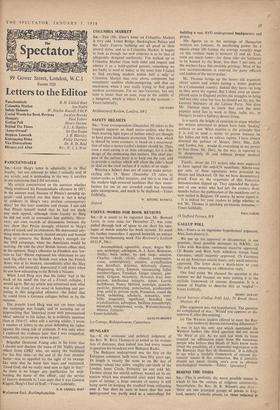Letters to the Editor
Passchendaele B. H. Liddell Hart Columbia Market Ian Nairn Safety Helmets W. Ritchie Russell, FRCP Useful Words for Book Reviews Jocelyn Brooke Hungary Paul Tabori Gallup Poll Henry Durant Behind The Times J. L. A. Hartley 'Astor-Owned' Sir Ifor Evans Stephen Leacock J. B. Blackley Kidnapping Blake Philip Sherrard Vice Prosecutions Dr. R. D. Reid Divorce and After Rev. W. J. S. Weir PASSCHENDAELE SIR,—Lord Haig's letter is admirable in its filial loyalty, but not relevant to what I actually said id my article, and is misleading in the way it ascribes to me statements that I did not make.
My article concentrated on the question whether 'Haig continued his Passchendaele offensive in 1917, in the autumn mud, because of Petain's pressing ap- peals'—and pointed out that there is 'not a scrap of evidence in Haig's very profuse contemporary diary' for this later assertion and excuse. I can add that Main himself stated that he had not made any such •appeal, although from loyalty to Haig he did not wish to contradict him publicly. More- over, our own records of discussions between the two show that Pdtain strongly objected to Haig's plan of attack and its objectives. He deprecated any- thing more than narrowly limited attacks and wanted Haig to conserve the British Army's strength for the 1918 campaign, when the Americans would be arriving. He told the chief British liaison officer that, in his opinion, Haig's offensive in Flanders was 'cer- tain to fail.' Main expressed his objections to any such big effort by the British even when the French Army was at its weakest, immediately after the May mutinies, and naturally deprecated it still more when he saw how exhausting to the British it became.
When Lord Haig says that his father 'had at the back of his mind' the fear of a French collapse, I would agree. But my article was concerned with what was at the front of his mind in launching and per- sisting in this misguided offensive—the belief that he could force a German collapse before or by the autumn.
The preseht Lord Haig was not yet born when the campaign was fought, and in accusing me of approaching that 'historical event with preconceived ideas' adverse to his father, he is evidently unaware than in 1916-17, when still a serving soldier, I wrote a number of letters to the press defending his father against the rising tide of criticism. It was only when I explored the evidence later that I was compelled, reluctantly, to revise my views in part.
Brigadier Desmond Young asks in his letter that I should now disclose the name of the 'highly placed officer from GHQ' who, on seeing the battlefield for the first time—at the end of the four months' battle—was so appalled by the sight of its swamp- like state that he burst into tears and exclaimed, 'Good God, did we really send men to fight in that?'• As there is no longer any justification for with- holding the name of this officer, and the service of history demands it, I can state that it was General Kiggell, Haig's Chief of Staff.—Yours faithfully, Wolverton Park, Buckinghamshire B. H. LIDDELL HART










































 Previous page
Previous page